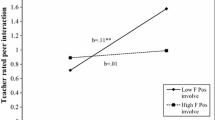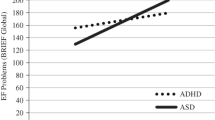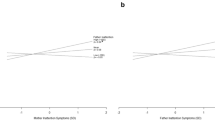Abstract
This study investigated the role of parenting stress, the parental involvement style, and attention-deficit/hyperactivity disorder (ADHD) symptoms in predicting academic achievement in 8- to 12-year-old children. Guided by the Family–School Relationships Model path analysis was used to compare the effects of a controlling versus supportive style of parental involvement in relation to children's learning. Results revealed that high levels of parenting stress were associated with the use of more controlling strategies regarding children’s academics, whereas lower stress was associated with a more supportive style of involvement. Controlling parental involvement was associated with more parent-rated symptoms of ADHD and lower academic achievement in children, while supportive involvement was associated with fewer parent-rated ADHD symptoms and higher achievement. The relation between both styles of parental involvement and academic achievement was accounted for by children’s inattention, but not hyperactivity/impulsivity, in the home. These findings demonstrate the combined risk of parenting stress, controlling parental involvement, and children’s inattentive behaviors for poor achievement in children.



Similar content being viewed by others
References
Abidin, R. R. (1995). Parenting stress index: Professional manual (3rd ed.). Lutz, FL: Psychological Assessment Resources, Inc.
Abikoff, H., & Gittelman, R. (1985). The normalizing effects of methylphenidate on the classroom behavior of ADHD children. Journal of Abnormal Child Psychology, 13, 33–44.
Adamakos, H., Ryan, K., Ulman, D. G., Pascoe, J., Diaz, R., & Chessare, J. (1986). Maternal social support as a predictor of mother-child stress and stimulation. Child Abuse and Neglect, 10, 463–470.
Adams, G. R., & Ryan, B. R. (2000). A longitudinal analysis of family relationships and children’s school achievement in one- and two-parent families. A report to Human Resources Development Canada. http://www.hrsdc.gc.ca/en/cs/sp/sdc/pkrf/publications/research/2000-000180/page08.shtml
Adams, G. R., Ryan, B. A., Ketsetzis, M., & Keating, L. (2000). Rule compliance and peer sociability: A study of family process, school-focused parent-child interactions, and children's classroom behavior. Journal of Family Psychology, 14(2), 237–250.
Baker, D. D. (1994). Parenting stress and ADHD: A comparison of mothers and fathers. Journal of Emotional and Behavioral Disorders, 2, 46–50.
Barkley, R. A. (2006). Attention-Deficit/Hyperactivity Disorder: A handbook for diagnosis and treatment (3rd ed.). New York: Guilford.
Barkley, R. A., Fischer, M., Smallish, L., & Fletcher, K. (2006). Young adult outcome of hyperactive children: Adaptive functioning in major life activities. Journal of the American Academy of Child and Adolescent Psychiatry, 45, 192–202.
Belsky, J. (1984). The determinants of parenting: A process model. Child Development, 55, 83–96.
Biederman, J., Milberger, S., Faraone, S. V., Kiely, K., Guite, J., Mick, E., et al. (1995). Family environment risk factors for attention deficit hyperactivity disorder: A test of Rutter’s indicators of adversity. Archives of General Psychiatry, 52, 464–470.
Byrne, B. M. (1998). Structural equation modeling with LISREL, PRELIS, and SIMPLIS: Basic concepts, applications, and programming. Mahwah, NJ: Lawrence Erlbaum Associates.
Callahan, K., Rademacher, J. A., & Hildreth, B. L. (1998). The effect of parent participation in strategies to improve the homework performance of students who are at risk. Remedial and Special Education, 19, 131–141.
Carte, E. T., Nigg, J. T., & Hinshaw, S. P. (1996). Neuropsychological functioning, motor speed, and language processing in boys with and without ADHD. Journal of Abnormal Child Psychology, 24, 481–498.
Cohen, N. J., Vallance, D. D., Barwick, M., Im, N., Menna, R., Horodezky, N. B., et al. (2000). The interface between ADHD and language impairment: An examination of language, achievement, and cognitive processing. Journal of Child Psychology and Psychiatry, 41, 353–362.
Conger, R. D., Patterson, G. R., & Ge, X. (1995). It takes two to replicate: A mediational model for the impact of parents' stress on adolescent adjustment. Child Development, 66(1), 80–97.
Conners, C. K. (1997). Conners’ ratings scales—revised: Technical manual. Toronto, ON: Multi-Health Systems Inc.
Currie, J., & Stabile, M. (2006). Child mental health and human capital accumulation: The case of ADHD. Journal of Health Economics, 25, 1094–1118.
Dally, K. (2006). The influence of phonological processing and inattentive behavior on reading acquisition. Journal of Educational Psychology, 98, 420–437.
Darling, N., & Steinberg, L. (1993). Parenting style as context: An integrative model. Psychological Bulletin, 113, 487–496.
Deater-Deckard, K. (2004). Parenting stress. New Haven, CT: Yale University Press.
Deater-Deckard, K., & Scarr, S. (1996). Parenting stress among dual-earner mothers and fathers: Are there gender differences? Journal of Family Psychology, 10(1), 45–59.
DuPaul, G. J., & Stoner, G. (2003). ADHD and learning difficulties: What is the connection? In G. J. DuPaul & G. Stoner (Eds.), ADHD in the schools: Assessment and intervention strategies (pp. 72–108). New York: Guilford.
DuPaul, G. J., Volpe, R. J., Jitendra, J., Lutz, G., Lorah, K. S., & Gruber, R. (2004). Elementary school students with ADHD: Predictors of academic achievement. Journal of School Psychology, 42, 285–301.
Eskilson, A., Wiley, M. G., Muehlbauer, G., & Dodder, L. (1986). Parental pressure, self-esteem, and adolescent reported deviance: Bending the twig too far. Adolescence, 21, 501–515.
Fan, X., & Chen, M. (2001). Parental involvement and students’ achievement: A meta-analysis. Educational Psychology Review, 13, 1–22.
Fassinger, R. E. (1987). Use of structural equation modeling in counseling psychology research. Journal of Counseling Psychology: Special Issue: Quantitative Foundations of Counseling Psychology Research, 34, 425–436.
Fergusson, D. M., & Horwood, L. J. (1995). Early disruptive behavior, IQ, and later school achievement and delinquent behavior. Journal of Abnormal Child Psychology, 23, 183–199.
Franceschini, A. (2004). A longitudinal study of family relationships as mediators of children’s schooling outcomes. Unpublished Master’s thesis. University of Guelph, Guelph, ON, Canada.
Frazier, T. W., Youngstrom, E. A., Glutting, J. J., & Watkins, M. W. (2007). ADHD and achievement: Meta-analysis of the child, adolescent, and adult literature and a concomitant study with college students. Journal of Learning Disabilities, 40, 49–65.
Frick, P. J., Kamphaus, R. W., Lahey, B. B., Loeber, R., Christ, M. A. G., Hart, E. L., et al. (1991). Academic underachievement and the disruptive behavior disorders. Journal of Consulting and Clinical Psychology, 59, 289–294.
Gerrard, L., & Anastopoulos, A. D. (2005, August). The relationship between ADHD and mother-child attachment in early childhood. Paper presented at the Annual Meeting of the American Psychological Association, Washington, DC.
Ginsburg, G. S., & Bronstein, P. (1993). Family factors related to children’s intrinsic/extrinsic motivational orientation and academic performance. Child Development, 64, 1461–1474.
Goldstein, L. H., Harvey, E. A., Friedman-Weieneth, J. L., Peirce, C., Tellert, A., & Sippel, J. C. (2007). Examining subtypes of behavior problems among 3-year-old children, part II: Investigating differences in parent psychopathology, couple conflict, and other family stressors. Journal of Abnormal Child Psychology, 35, 111–123.
Grolnick, W. S. (2003). The psychology of parental control: How well-meant parenting backfires. Mahwah, NJ: Lawrence Erlbaum Associates Publishers.
Grolnick, W. S., Ryan, R. M., & Deci, E. L. (1991). The inner resources for school achievement: Motivational mediators of children’s perceptions of their parents. Journal of Educational Psychology, 83, 508–517.
Habboushe, D. F., Daniel-Crotty, S., Karustis, J. L., Leff, S. S., Costigan, T. E., Goldstien, S. G., et al. (2001). A family-school intervention program for children with Attention-Deficit/Hyperactivity Disorder. Cognitive and Behavioral Practice, 8, 123–136.
Hinshaw, S. P. (1992). Externalizing behavior problems and academic underachievement in childhood and adolescence: Causal relationship and underlying mechanisms. Psychological Bulletin, 111, 127–155.
Holmbeck, G. N. (1997). Toward terminological, conceptual, and statistical clarity in the study of mediators and moderators: Examples from the child-clinical and pediatric literatures. Journal of Consulting and Clinical Psychology, 65, 599–610.
Hong, S., & Ho, H. Z. (2005). Direct and indirect longitudinal effects of parental involvement on student achievement: Second-order latent growth modeling across ethnic groups. Journal of Educational Psychology, 97, 32–42.
Hoover-Dempsey, K. V., & Sandler, H. M. (1995). Parental involvement in children’s education: Why does it make a difference? Teachers College Record, 97, 310–331.
Hoover-Dempsey, K. V., & Sandler, H. M. (2005). Final performance report for OERI grant # R305T010673. The social context of parental involvement: A path to enhanced achievement. Presented to Project Monitor, Institute of Education Sciences, U.S. Department of Education, March 22, 2005.
Hoover-Dempsey, K. V., Walker, J. M. T., Sandler, H. M., Whetsel, D., Green, C. L., Wilkins, A. S., et al. (2005). Why do parents become involved? Research findings and implications. Elementary School Journal, 106, 105–131.
Hoyle, R. H. (1995). Structural equation modeling: Concepts, issues, and applications. An introduction focusing on AMOS. Thousand Oaks, CA: Sage Publications.
Hu, L. T., & Bentler, P. (1995). Evaluating model fit. In R. H. Hoyle (Ed.), Structural equation modeling. Concepts, issues, and applications (pp. 76–99). London: Sage.
Johnston, C., Hommersen, P., & Siepp, C. (2008). Acceptability of behavioral and pharmacological treatments for Attention-Deficit/Hyperactivity Disorder: Relations to child and parent characteristics. Behavior Therapy, 39, 22–32.
Johnston, C., & Jassy, J. S. (2007). Attention-Deficit/Hyperactivity Disorder and Oppositional/Conduct problems: Links to parent-child interactions. Journal of Canadian Academy of Child and Adolescent Psychiatry, 16, 74–79.
Johnston, C., & Mash, E. J. (2001). Families of children with Attention-Deficit/Hyperactivity Disorder: Review and recommendations for future research. Clinical Child and Family Psychology Review, 4, 183–207.
Johnston, C., Murray, C., Hinshaw, S. P., Pelham, W. E., & Hoza, B. (2002). Responsiveness of interactions of mothers and sons with ADHD: Relations to maternal and child characteristics. Journal of Abnormal Child Psychology, 30, 77–88.
Johnston, C., & Scoular, D. (2008). The family context of ADHD. In K. McBurnett & L. Pfiffner (Eds.), Attention-Deficit/Hyperactivity Disorder: Concepts, controversies, new directions (pp. 41–50). New York: Informa Health Care.
Jöreskog, K. G., & Sörbom, D. (1993). LISREL 8: Structural equation modeling with the SIMPLIS command language. Chicago, IL: Scientific Software International; Hillsdale, NJ: Lawrence Erlbaum Associates, Inc.
Joussemet, M., Koestner, R., Lekes, N., & Landry, R. (2005). A longitudinal study of the relationship of maternal autonomy-support to children’s adjustment and achievement in school. Journal of Personality, 73, 1215–1236.
Ketsetzis, M., Ryan, B. A., & Adams, G. R. (1998). Family processes, parent-child interactions, and child characteristics influencing school-based social adjustment. Journal of Marriage and the Family, 60, 374–387.
Khamis, V. (2006). Family environment and parenting as predictors of Attention-Deficit/Hyperactivity Disorder among Palestinian children. Journal of Social Service Research, 32, 99–116.
Klein, D. N., & Riso, L. P. (1993). Psychiatric disorders: Problems of boundaries and comorbidity. New York, NY: Guilford Press.
Kline, R. B. (2005). Principles and practice of structural equation modeling (2nd ed.). New York, NY, US: Guilford Press.
Koutsoulis, M. K., & Campbell, J. R. (2001). Family processes affect students’ motivation, and science and math achievement in Cypriot high schools. Structural Equation Modeling, 8, 108–127.
Lifford, K. J., Harold, G. T., & Thapar, A. (2008). Parent-child relationships and ADHD symptoms: A longitudinal analysis. Journal of Abnormal Child Psychology, 36, 285–296.
Loe, I. M., & Feldman, H. M. (2007). Academic and educational outcomes of children with ADHD. Journal of Pediatric Psychology, 32, 643–654.
Loehlin, J. C. (1992). Latent variable models: An introduction to factor, path, and structural analysis (2nd ed.). Hillsdale, NJ: Lawrence Erlbaum.
Mannuzza, S., Klein, R. G., & Moulton, J. L. (2002). Young adult outcome of children with “situational” hyperactivity: A prospective controlled follow-up study. Journal of Abnormal Child Psychology, 30, 191–198.
Martinez-Pons, M. (1996). Test of a model of parental inducement of academic self-regulation. Journal of Experimental Education, 64, 213–227.
McLaughlin, D. P., & Harrison, C. A. (2006). Parenting practices of mothers of children with ADHD: The role of maternal and child factors. Child and Adolescent Mental Health, 11, 82–88.
McLoyd, V. C., Jayaratne, T. E., Ceballo, R., & Borquez, J. (1994). Unemployment and work interruption among African American single mothers: Effects on parenting and adolescent socioemotional functioning. Child Development, 65, 562–589.
McLoyd, V. C., & Wilson, L. (1991). The strain of living poor: Parenting, social support and child mental health. In A. C. Hutson (Ed.), Children in poverty (pp. 105–135). New York: Cambridge University Press.
Midgett, J. D. (2000). Exploring parental school-focused behaviors: A factor analysis of parents’ and children’ reports. Unpublished doctoral dissertation. University of Guelph, Guelph, ON, Canada.
Midgett, J., Ryan, B. A., Adams, G. R., & Corville-Smith, J. (2002). Complicating achievement and self-esteem: Considering the joint effects of child characteristics and parent-child interactions. Contemporary Educational Psychology, 27, 132–143.
Niggli, A., Trautwein, U., Schnyder, I., Ludtke, O., & Neumann, M. (2007). Parental homework support can be beneficial, but parental intrusion is detrimental: Family background, parental homework supervision, and performance gains. Psychologie In Erziehung und Unterricht, 54, 1–14.
Pfiffner, L. J., & Barkley, R. A. (1998). Treatment of ADHD in school settings. In R. A. Barkley (Ed.), Attention-Deficit/Hyperactivity Disorder: A handbook for diagnosis and treatment (2nd ed., pp. 458–490). New York: Guilford Press.
Pomerantz, E. M., & Eaton, M. M. (2001). Maternal intrusive support in the academic context: Transactional socialization processes. Developmental Psychology, 37, 174–186.
Pomerantz, E. M., Grolnick, W. S., & Price, C. E. (2005). The role of parents in how children approach achievement: A dynamic process perspective. New York, NY: Guilford Publications.
Pomerantz, E. M., Moorman, E. A., & Litwack, S. D. (2007). The how, whom, and why of parents’ involvement in children’s academic lives: More is not always better. Review of Educational Research, 77, 373–410.
Power, T. J., Karustis, J. L., & Habboushe, D. F. (2001). Homework success for children with ADHD: A family-school intervention program. New York: Guilford.
Power, T. J., Werba, B. E., Watkins, M. W., Angelucci, J. G., & Eiraldi, R. B. (2006). Patterns of parent-reported homework problems among ADHD-referred and non-referred children. School Psychology Quarterly, 21, 13–33.
Rabiner, D., & Coie, J. D. (2000). Early attention problems and children’s reading achievement: A longitudinal investigation. The conduct problems prevention research group. Journal of the American Academy of Child and Adolescent Psychiatry, 39, 859–867.
Raggi, V. L., & Chronis, A. M. (2006). Interventions to address the academic impairment of children and adolescents with ADHD. Clinical Child and Family Psychology Review, 9, 85–111.
Rapport, M. D., Scanlan, S. W., & Denney, C. B. (1999). Attention-Deficit/Hyperactivity Disorder and scholastic achievement: A model of dual developmental pathways. Journal of Child Psychology and Psychiatry, 40, 1169–1183.
Reay, D. (2000). A useful extension of Bourdieu’s conceptual framework? Emotional capital as a way of understanding mothers’ involvement in their children’s education? Sociological Review, 48, 568–585.
Rogers, M. A. (2002). Predictors of academic achievement: An exploration of child and family predictors. Unpublished Master’s thesis. University of Guelph, Guelph, ON, Canada.
Rogers, M. A. (2008). Parental involvement in children with and without ADHD. Unpublished doctoral dissertation. University of Toronto, Toronto, ON, Canada.
Rogers, M. A., Theule, J., Ryan, B., Adams, G., & Keating, L. (2009). Parental involvement and children’s school achievement: The mediating role of children’s academic competence. Canadian Journal of School Psychology, 24, 34–57.
Rogers, M. A., Wiener, J., Marton, I., & Tannock, R. (2009). Parental involvement in children’s learning: Comparing parents of children with and without Attention Deficit/Hyperactivity Disorder (ADHD). Journal of School Psychology, 47, 167–185.
Ryan, B. A., & Adams, G. R. (1995). The family-school relationships model. In B. Ryan, et al. (Eds.), The family-school connection: Theory, research, and practice (pp. 3–28). California: Sage Publications.
Sattler, J. M. (2001). Assessment of children: Cognitive applications (4th ed.). La Mesa, CA: Jerome M. Sattler Publisher, Inc.
Saudino, K. J., & Plomin, R. (2007). Why are hyperactivity and academic achievement related? Child Development, 78, 972–986.
Seigner, R. (1986). Mothers’ behaviors and sons’ performance: An initial test of an academic achievement path model. Merrill-Palmer Quarterly, 32, 153–166.
Stiefel, I. (1997). Can disturbance in attachment contribute to attention deficit hyperactivity disorder? A case discussion. Clinical Child Psychology and Psychiatry, 2, 45–64.
Todd, R. D., Sitdhiraksa, N., Reich, W., Ji, T. H. C., Joyner, C. A., Heath, A. C., et al. (2002). Discrimination of DSM-IV and latent class attention-deficit/hyperactivity disorder subtypes by educational and cognitive performance in a population-based sample of child and adolescent twins. Journal of the American Academy of Child and Adolescent Psychiatry, 41, 820–828.
Torgersen, R., Gjervan, B., & Rasmussen, K. (2006). ADHD in adults: A study of clinical characteristics, impairment, and comorbidity. Nordic Journal of Psychiatry, 60, 38–43.
Tripp, G., Schaughency, E. A., Langlands, R., & Mouat, K. (2007). Family interactions in children with and without ADHD. Journal of Child and Family Studies, 16, 385–400.
Walker, J. M. T., Wilkins, A. S., Dallaire, J. R., Sandler, H. M., & Hoover-Dempsey, K. V. (2005). Parental involvement: Model revision through scale development. Elementary School Journal, 106, 85–104.
Warner-Rogers, J., Taylor, A., Taylor, E., & Sandberg, S. (2000). Inattentive behaviour in childhood: Epidemiology and implications for development. Journal of Learning Disabilities, 33, 520–536.
Wechsler, D. (1999). Wechsler abbreviated scale of intelligence. San Antonio, TX: Psychological Corporation.
Wechsler, D. (2003). Wechsler intelligence scale for children—IV. San Antonio, TX: Psychological Corporation.
Westby, C. E., & Cutler, S. K. (1994). Language and ADHD: Understanding the bases and treatment of self-regulatory deficits. Topics in Language Disorders Special Issue: ADD and It’s Relationship to Spoken and Written Language, 14, 58–76.
Willcutt, E. G., Doyle, A. E., Nigg, J. T., Faraone, S. V., & Pennington, B. F. (2005). Validity of the executive function theory of attention-deficit/hyperactivity disorder: A meta-analytic review. Biological Psychiatry, 57, 1336–1346.
Winsler, A. (1998). Parent-child interactions and private speech in boys with ADHD. Applied Developmental Science, 2, 17–39.
Woodcock, R. W., McGrew, K. S., & Mather, N. (2001). Woodcock-Johnson tests III of achievement. Itasca, IL: Riverside Publishing.
Woodward, L., Taylor, E., & Dowdney, L. (1998). The parenting and family functioning of children with hyperactivity. Journal of Child Psychology and Psychiatry, 39, 161–169.
Acknowledgment
The authors gratefully acknowledge the Social Sciences and Humanities Research Council of Canada for funding this project, as well as Daniella Biondic and Amy Hsu for their assistance.
Author information
Authors and Affiliations
Corresponding author
Rights and permissions
About this article
Cite this article
Rogers, M.A., Wiener, J., Marton, I. et al. Supportive and Controlling Parental Involvement as Predictors of Children’s Academic Achievement: Relations to Children’s ADHD Symptoms and Parenting Stress. School Mental Health 1, 89–102 (2009). https://doi.org/10.1007/s12310-009-9010-0
Published:
Issue Date:
DOI: https://doi.org/10.1007/s12310-009-9010-0




